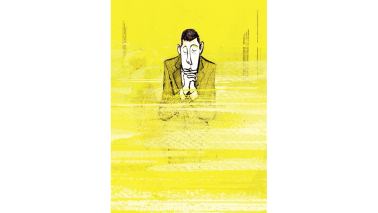
Cecilia Bartoli
Barbican
Messiah
Coliseum
After a brief but inspissatedly tedious overture by Porpora, played by Il Giardino Armonico, the curtains at the Barbican were pulled aside and Cecilia Bartoli, dressed like a highwayperson from a 1940s escapist movie, sprang on to the stage, flung off her feathered hat, rocked with superabundant energy as the orchestra played the introduction to her first aria, from another opera of Porpora’s, and launched into the first of many elaborate analogies between love and other conditions which might give an excuse for lots of drooping and even more giddy coloratura. She was on amazing form, and was greeted and received with almost hysterical rapture.
Last year I was not the only reviewer to feel that her concert was reminiscent of late Schwarzkopf, but that couldn’t have occurred to anyone this year. She is promoting her latest album, Sacrificium, a tribute to the many thousands of boys who were castrated in the hope of pleasing the Church vocally and in other ways. The notes make gruelling reading, but Bartoli, while writing touchingly about the sacrifice, is determined to make the best of what came out of it, which seems, on the evidence of the concert and CD, to be an unending series of operas by mediocrities who were fully versed in producing arias that demonstrate what the castrati could do by way of breath control, immense vocal range, and generalised expressiveness.
There was Handel too, of course, but we all know him, and he had to wait until the encores. Up to then, concentration was exclusively on the performer, and any expectations anyone had were more than fulfilled — unless they expected a voice of some volume. For what immediately registered, from the human volcano onstage, was how small the voice now is, never having been large. Bartoli is so expert in making the most of what she does have, though, that that is soon forgotten, as she personifies first forlornness, the resignations, then resolution, defiance, all the while managing facial expressions which roughly correspond to the outpourings of passion.
Such utter accomplishment is disarming, and even if I felt hardly any of this music deserved resurrection — and it is perhaps the least distinguished that Bartoli has unearthed since she began her campaigns on behalf of near-forgotten composers, which, I’m relieved to say, have borne no fruit whatever — I was stunned by the only thing that mattered, and impressed by the generosity of her programme, a notable contrast to the stinginess of other contemporary divas. But what will happen when Bartoli resumes singing great opera? Anyone who can get to Dortmund for Norma next year will be able to find out.
Some of the most irritating evenings I have spent in the past dozen years have been at productions by Deborah Warner, and Messiah at ENO must rank high on the list. The first question is: why stage Messiah? Since there is no intelligent positive answer, we can move on to consider what this staging was like. The curtain rises on scenes of everyday life, a woman ironing, someone at his PC, someone else at his TV, a hospital bed, a small boy, who is wearyingly ubiquitous, running between benches, then a drab chorus, jeans and T-shirts, strolling on; a projected cityscape at the back. By what kind of miracle could these people become interesting enough to be bearable as companions for Eternity?
That’s not a question Handel asked, but in her insistence on the commonplace Warner compels us to — not that she would mind, since in an absurd interview printed in the programme, she insists on ‘opening the text and asking it all the questions it can bear’. A bit further on she says, ‘The tenor soloist sings, “Comfort ye, my people”, but he isn’t really fluent or confident about that injunction.’ Isn’t he? What makes her think that? This is director’s cliché-land, and is translated into practice passim. The ghastliness of seeing the everyday translated into the everyday is augmented when dancers enter, more or less at random points, and do what dancers do: one who is to be taken as Christ writhes during the sublime passion music, brief as it is, of Part Two, then is tossed around by two others.
The musical side of things — all that there should be, and in a concert hall or church — is better, but not so much as I hoped. Only the contralto soloist, Catherine Wyn-Rogers, brings dignity and intensity to her music, and ‘He was despised’, sung with grief and then fury, is the one deep moment. Even John Mark Ainsley was in pinched voice, squeaking his way through ‘Thou shalt dash them in pieces’. And the chorus is altogether too merely operatic. I’d have expected Laurence Cummings to urge them to some more committed singing than any they produced — but perhaps they were depressed, too, by how ordinary they were meant to be.
ENO’s Messiah will be broadcast on BBC Radio Three on Christmas Day.





Comments